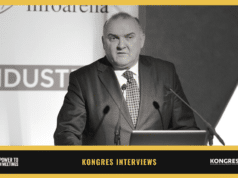In these challenging times, Kongres Magazine is trying its best to provide meeting planners with the most relevant and useful information regarding the spread of COVID-19. We also want to share opinions from key members of the meetings industry.
We asked key opinion makers from the meetings industry for their thoughts on the situation and how they are coping with COVID-19.
BOŠTJAN HORJAK, CEO of Liberty International Adriatic
make the best out of a bad situation
Q: How do you feel about the restrictions that European governments have implemented to contain the spread of COVID-19?
Well, probably still a month ago when it all started nobody was expecting such a dramatic flow of events regarding the coronavirus on a larger scale. I think that none of the Governments expected the virus would hit Europe in such a large scale and despite the information from China, it caught Europe completely unprepared. As they say, everybody can be a general after a battle, but I believe all European Governments should have taken drastic measures immediately when the first cases popped up in Italy.
Q: What would you compare this situation to?
I do not think we can compare the current situation to anything in the past. With the crisis in 2008, the economy was hit but people could still work to a certain extent. Now the whole world is paralyzed because of the virus and people physically cannot work as they are locked at home. But in my opinion, the worst is yet to come as the economy will face a decline and the meetings industry is always at the forefront when it comes to dispensable costs.
Q: Economic consequences for the meetings industry have already started to show, what do you expect government institutions to do?
Generally, in terms of jobs, the meetings and events industry creates more direct jobs than large manufacturing sectors such as automotive, chemicals, and food. The government should be aware that about 30.000 people in Slovenia are fully or partially employed in the meetings industry, which is creating jobs and an added value to the Slovenian economy. It is known that the meetings industry adds value to the economy as the average cost per conference attendee is much higher in comparison to regular tourists. Therefore, the government should do everything possible to retain the jobs of those employed. First, the government should exempt all self-employed, companies, institutes and other forms of legal entities from paying compulsory contributions and all fees for the period of complete prohibition of the organization of events. Second, the government should cover 80 % of the salary of employees who were forced to stay at home. And third, the government should offer loans at favourable conditions to all the companies that found themselves in financial difficulties.
Q: What is your opinion on virtual meetings, as an alternative to live events?
The discussion about virtual meetings is going on for over a decade. Yes, it is an alternative and a must in the current situation when people are not able to travel but it can in my opinion never substitute a live event.
Q: What precautions/measures are you taking in your company?
Thanks to technology we can move our office home literally overnight, so that is what we all did. All my employees are currently working from home. We had to narrow down the operational time by 20 % as there are still a lot of tasks we simply cannot do from home and most probably we will have to decrease the working time by another 20 %. I am very happy with my current team and the last thing I wish to do is to start dismissing them, but we have to be prepared for everything.
Q: What are your expectations regarding the duration of the crisis and when will the situation go back to normal?
When it comes to expectations regarding life, in general, going back to normal, I would say at the end of April or mid-May but when it comes to expectations regarding our industry, I think it will take about a year.
Q: Is marketing (digital marketing) in the duration of the pandemic sensible (and appropriate)?
Until we pass the middle point of the pandemic crisis marketing makes no sense as people are simply preoccupied with essential questions but when we will see that life is getting back to normal then it will be the right time for extensive marketing.
we used this time of limited activity for strategic thinking about improving our existing products and creating new products
Q: What will happen after we’ve beaten the virus? How will you (re)start your marketing activities?
We used this time of limited activity in terms of RFP’s for strategic thinking about improving our existing products as well as for creating new products. So, when the right time comes, we will launch marketing activities on the markets and in the forms that we will believe to have the fastest ROI.
Q: Are you in contact with colleagues from around the world? Have you talked about any potential solutions?
Being part of a global company I am in contact with my colleagues from all over the world on a daily basis. I am also in touch with our management team and we are searching for the best solutions in the current situation. But the problem is that things are changing so fast that new solutions need to be found literally on a daily basis.














